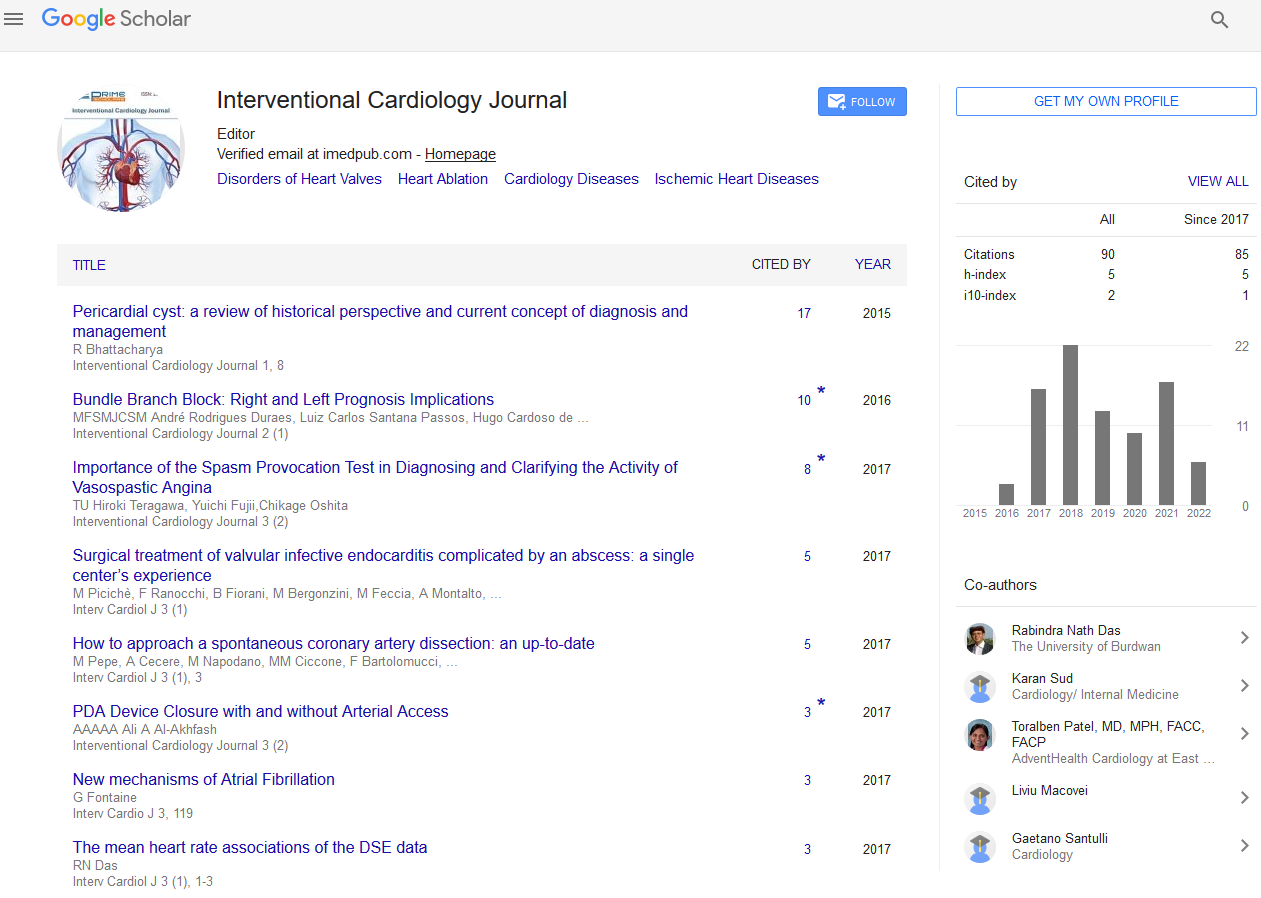Commentary - (2023) Volume 9, Issue 4
Safeguarding Heart Valves: Comprehensive Strategies for Preventing Valvular Disorders
Alfie Thomas*
Department of Cardiology, Northwestern University Feinberg School of Medicine, USA
*Correspondence:
Alfie Thomas,
Department of Cardiology, Northwestern University Feinberg School of Medicine,
USA,
Email:
Received: 29-Mar-2023, Manuscript No. IPIC-23-17375;
Editor assigned: 31-Mar-2023, Pre QC No. IPIC-23-17375 (PQ);
Reviewed: 14-Apr-2023, QC No. IPIC-23-17375;
Revised: 19-Apr-2023, Manuscript No. IPIC-23-17375 (R);
Published:
26-Apr-2023, DOI: 10.21767/2471-8157.9.4.40
Description
The heart's valves, essential components of the circulatory system,
play a crucial role in maintaining the unidirectional flow of
blood throughout the body. However, these intricate structures
can be susceptible to disorders that compromise their function,
leading to a range of cardiovascular complications. Prevention
is a key aspect of ensuring heart health and minimizing the
risk of valvular disorders. This article explores the multifaceted
strategies for preventing disorders of heart valves, focusing
on lifestyle modifications, early detection, medical interventions,
and the pivotal role of patient education in safeguarding
heart valve health. Preventing disorders of heart valves involves
a combination of proactive measures aimed at reducing
risk factors, identifying potential issues early, and maintaining
optimal cardiovascular health. By addressing modifiable risk
factors and adhering to healthy lifestyle practices, individuals
can significantly reduce their risk of developing valvular disorders
and related complications. A balanced diet is essential
for heart health and preventing valvular disorders. Limiting
salt intake helps prevent fluid retention and reduces the risk
of high blood pressure. These foods provide essential vitamins,
minerals, and antioxidants that promote heart health. Opt for
unsaturated fats found in sources like nuts, avocados, and olive
oil, while minimizing saturated and trans fats. Engage in at
least 150 minutes of moderate-intensity aerobic exercise per
week to improve heart function and circulation. Incorporate
resistance training to build muscle strength and support overall
cardiovascular fitness. Quitting smoking is a crucial step toward
preventing valvular disorders. Quitting smoking reduces
the risk of atherosclerosis and inflammation, which contribute
to valvular issues. Stress reduction promotes heart health. Engage
in practices like meditation, deep breathing, and yoga to
manage stress levels. Physical activity is a natural stress reliever
and helps maintain cardiovascular health. Routine medical
check-ups facilitate early detection of risk factors and potential
valvular disorders. Regularly monitor blood pressure and work
with healthcare providers to maintain healthy levels. Regular
physical exams allow doctors to listen for murmurs or abnormal
heart sounds that could indicate valvular issues. In cases of suspected
valvular disorders, imaging tests like echocardiograms
provide detailed insights into heart valve function and structure,
aiding early diagnosis. Medical interventions may be recommended
to manage risk factors and prevent the progression
of valvular disorders: Managing hypertension reduces strain on
heart valves and lowers the risk of complications. Statins can
help control cholesterol levels and minimize plaque buildup
that can affect valve function. For individuals at risk of infective
endocarditis, antibiotics may be prescribed before certain
dental or medical procedures to prevent bacterial infections
that can damage heart valves. Preventing disorders of heart
valves requires a comprehensive approach that encompasses
lifestyle modifications, early detection, medical interventions,
and patient education. By taking proactive steps to address risk
factors, individuals can significantly reduce their likelihood of
developing valvular disorders and associated complications.
Through collaboration between healthcare providers and patients,
valvular health can be safeguarded, ensuring that the
heart's valves continue to function optimally and contribute to
overall cardiovascular well-being. In this journey toward heart
health, prevention emerges as a potent shield against the challenges
posed by valvular disorders, enabling individuals to lead
healthier, more fulfilling lives.
Acknowledgement
None.
Conflict Of Interest
The author’s declared that they have no conflict of interest.
Citation: Thomas A (2023) Safeguarding Heart Valves: Comprehensive Strategies for Preventing Valvular Disorders. Interv Cardiol J. 9:40.
Copyright: © 2023 Thomas A. This is an open-access article distributed under the terms of the Creative Commons Attribution License, which permits unrestricted use, distribution, and reproduction in any medium, provided the original author and source are credited.

